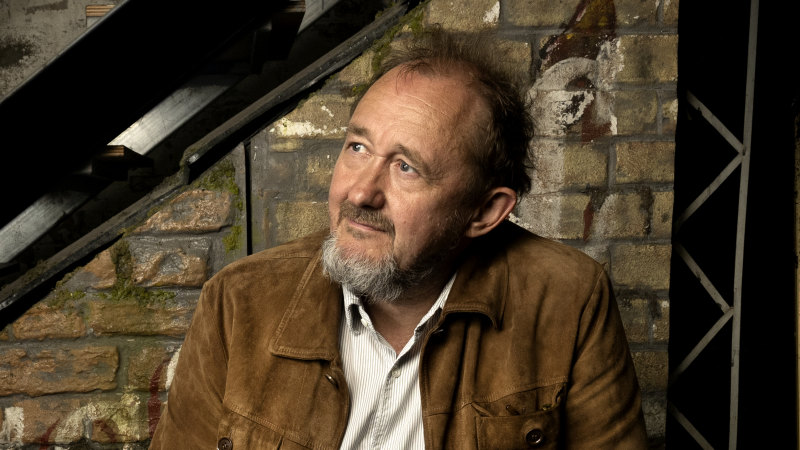Save articles for later
Add articles to your saved list and come back to them any time.
The first time Andrew Upton saw The Seagull, the production starred his then-fiancee Cate Blanchett.
It was March 1997, and the couple had got engaged after just three weeks dating. In the production at Belvoir St Theatre in Sydney, Blanchett played aspiring actress Nina, opposite Richard Roxburgh as her love interest, the novelist Trigorin, and Noah Taylor as Konstantin, the budding playwright who is infatuated with her.
“I must have seen it 13 or 14 times,” Upton says. “Her Nina was almost dangerously naive; too fragile for the world.”
Andrew Upton returns to Australian theatre for the first time in six years with The Seagull.Credit: Louise Kennerley
Now, Upton is returning to Australian theatre for the first time in six years with his own adaptation of The Seagull for the Sydney Theatre Company, where he was artistic director from 2008 to 2015. The new production is directed by Imara Savage, and stars Sigrid Thornton, Harry Greenwood and Megan Wilding.
In the play a group of people brought together at a country house where they find their romantic desires and creative ambitions are often at odds – for instance, Trigorin, Nina’s love interest, is already in a relationship with an older woman, Irina, Konstantin’s mother.
“The play is not about the creative process. Don’t worry, it really isn’t,” Upton says. “It is about the making of work and the effect that has on your life – what part of your life it comes out of, what part it enriches, but also the part that it exploits or degrades.”
Upton has a history of adapting Chekhov, including his last local production Three Sisters; The Cherry Orchard; Uncle Vanya; and The Present, his reinterpretation of the Russian playwright’s untitled first play, which toured to Broadway in 2017.
The Present, starring Richard Roxburgh and Cate Blanchett, opened in Sydney in 2015.Credit: Lisa Tomasetti
But Upton was hesitant about adapting The Seagull; he had to be convinced to take on the challenge by Savage and STC artistic director Kip Williams. “He knew it was probably the one Chekhov I’m most scared of,” Upton says.
His cautiousness stems from his belief that Chekhov’s last three plays – Uncle Vanya, Three Sisters and The Cherry Orchard – are beautifully structured, compared to The Seagull.
“It’s not as well-formed,” he says. “There’s more room for someone to think, like me, that you can solve this or make that better. And you can’t. You just do what you can to make it work for today.”
So that’s what Upton set out to do, moving the play’s action from rural Russia at the turn of the century to Australia in the early 2000s. He started his adaptation, as he often does, by thinking about what music his characters would have been listening to.
The starting point for The Seagull was The Birthday Party’s Mutiny in Heaven, a song released shortly before the Nick Cave-fronted band broke up. It conjured an image of the St Kilda art scene in the late ’70s and early ’80s – a period the older generation of characters lived through.
“What [characters] are listening to is going to tell me who they are,” Upton says. “[The music] gave me this really strong artistic world that they may well have come from, which I found quite alluring because it was very punky and quite dangerous, which actually really suited Irina’s base temperament.”
Sydney Theatre Company’s Australian punk-inspired The Seagull is one of a bevy of high-profile Chekhov productions around the world over the past couple years. In 2022, a new production of The Seagull opened in London, starring Game of Thrones′ Emilia Clarke, while two productions of Uncle Vanya made the news – one in London this year starring only one actor, Andrew Scott of Fleabag fame, and another due for 2024, with The Office’s Steve Carell making his Broadway debut in the title role.
Sigrid Thornton, who plays Irina, in rehearsals for The Seagull at STC.Credit: Prudence Upton
Upton says that Chekhov remains so relevant because his plays have resonances to the contemporary western world, especially in terms of class and wealth disparity.
“There is inside Chekhov a very prescient sense of foreboding that this thing we’ve set up, this fragile [thing], be it a family, be it a community, be it a society, is doomed to fail … Short of wanting to sound like some kind of doom merchant, it does not surprise me that people are thinking about that.
“The overview [of Chekhov’s work] is that holding a society together takes work; while you’re doing it, it always feels pretty shit, but if you don’t do it, it’s a nightmare.”
The Seagull is at Roslyn Packer Theatre until December 16.
The Booklist is a weekly newsletter for book lovers from books editor Jason Steger. Get it delivered every Friday.
Most Viewed in Culture
From our partners
Source: Read Full Article





